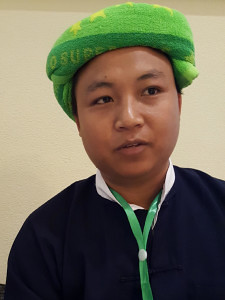During the two-day media development conference, the Southeast Asian Press Alliance (SEAPA) met with Khun Yar Zar, founder and editor in chief of the People’s Voice Journal based in Taunggyi, Shan State. It’s his third time joining the media conference, which was held at the Chatrium Hotel in Yangon this year.
He shared his view on the obstacles and challenges faced by ethnic media. He and his colleague were sued by Pa-O National Organization (PNO) for defamation and charged to pay 30,000 Kyats (~US$ 30) fine by the court. The editors went to court 37 times since the case was first filed in 2015.

Based on my own experience (during) the 2015 General Elections, we covered various articles and investigative reporting on human rights abuses happened in our area, and published in our paper and Facebook, and Taunggyi Times website. For those articles, I used my real name “Khun Yar Zar.” So, the local authority knew me and threatened that if their party didn’t win the election, they would kill me. Their threats made me feel nervous. As I used motorbike for my transportation, they (could have killed me) anytime. But, there were also Pa-O people who love to hear the truth. So, I shared my situation with them. Besides, there were a few friends among the armed-group whom I talked about the threats against me. I also requested them to receive our phone calls if anything happened to me or my colleagues. I am not afraid, but I have concerns. Just before the Elections, there were international teams that came to our area to collect data related to the Elections and issues around the ethnic area. They also reached me, so I explained to them about my situation.
If something happened, who can protect you and what is the impact on future reporting?
There is no one. If something bad happened, we suffered first. Whoever wants to help us can come in only later. This kind of uncertainty of security has negative impact on our reporting. The news I wrote is for the public, not for me. But the local authorities do not understand that these news are just the facts, not my opinion. And they threatened me, the consequences became negative for both public and local authorities. For instance, one of my news in 2015 led to the unity among some local party members and better preparation for contesting in the elections because the news served as reminders pointing out their weaknesses. Later in the elections, all nine party members won their seat in the Pa-O controlled area. This is the positive impact from our news. Later, we didn’t receive more threats from the local parties.
On the other hand, there are negative impact such as being harassed, getting sued with defamation, and the worst case, being shot dead. But, I will continue my news writing as long as my articles bring “truth” for our people. In our area, the roots of feudalism and cooperating with military dictators are still deeply entrenched. If we cannot fight such rotten systems, our next generations will have the same suffering as us. So, I stand firmly on my belief to reveal the truth even if it takes my life.
Can the mainstream media report thoroughly about the issues in your area and other ethnic area?
No, It is quite difficult for journalists from the mainstream media to travel to ethnic areas. Besides in our area, because of the abuses from the Burmese Army, our people dislike the Burman. And they hate if someone uses the Burmese language. So, it is very hard for (mainstream media which uses the Burmese language) to come to our area, investigate, and report thoroughly. I don’t know whether their absence is because of that fact. But, they never came to cover in our area. Before I became a journalist, there was an incident in one Pa-O village that was absolutely burnt down. No mainstream media covered that issue. I suffered for that and decided to become a journalist.
Were you in the wrong in the defamation case you faced? What is the update on the defamation case?
We are not wrong to cover that news because it is for the public’s benefit. Besides, it is the true story. But, the way the judge handled our case proved that the court wasn’t independent and was influenced by the local administrative power. Now, we are going to appeal until we are granted the truth. We got fine to pay, (which amounts to) 30,000 Kyats (~US$ 30), or (face) one month imprisonment. The law was twisted saying that the appeal can be made only for cases with fine of up to 50,000 Kyats (~US$ 50). So, it seems that the authority tried to block our appeal. Though the appeal is impossible, we can request for correction.
The local authority aims to put down our paper’s reputation so that we cannot continue. Actually, our paper earns the trust of the Pa-O community.
Prachatai English is an independent, non-profit news outlet committed to covering underreported issues in Thailand, especially about democratization and human rights, despite pressure from the authorities. Your support will ensure that we stay a professional media source and be able to meet the challenges and deliver in-depth reporting.
• Simple steps to support Prachatai English
1. Bank transfer to account “โครงการหนังสือพิมพ์อินเทอร์เน็ต ประชาไท” or “Prachatai Online Newspaper” 091-0-21689-4, Krungthai Bank
2. Or, Transfer money via Paypal, to e-mail address: [email protected], please leave a comment on the transaction as “For Prachatai English”
